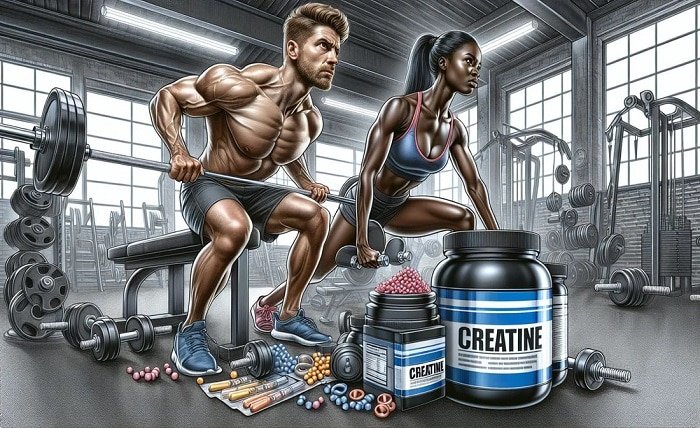Optimizing Your Fitness Journey: Pre Workouts, Strength Training, and Creatine

When starting a fitness journey, understanding which pre-workouts to use, how to strength train effectively, and which foods contain creatine can help beginners see real progress faster. This guide will break down essential components to help you succeed, drawing insights from the experts at MuscleTech.
Pre-Workouts for Beginners
Measure of perceived level of readiness and well-being before exercise Frequently used by individuals new to fitness wanting more energy, focus, and performance Benefits garnered from pre-workout supplements Pre-workouts are a common way people help augment their stimulant intake for the morning workout. Pre workouts for beginners are designed to boost energy, focus, and endurance during exercise, often containing ingredients like caffeine, creatine, and BCAAs to enhance performance and reduce fatigue. So here are a few top ones that you can opt for as beginners:
1. EuphoriC Pre-Workout: This caffeine-free supplement contains paraxanthine as its clear energy is a smoother one that does not cause jitters like you experience when taking standard caffeinated supplements. Is formulated to increase blood flow, mental focus and overall performance.
1. Amino Build: This stack combines must-have BCAAs for strength, endurance & recovery. It works great for women who are trying to build muscle and improve their general low fitness levels.
2. 100% Caffeine: If you love coffee and are looking for a caffeine-based pre workout to get that extra kick to push through your workouts. Focus booster that is linked to a better workout, with decreased fatigue.
3. Shatter Ripped: Beginner Fat loss and muscle definition Shatter Ripped Thermogenic Pre-Workout penetrates fat and muscle, thanks to potent ingredients built into this thermogenic pre-workout that’s convenient too.
If you decide to give pre-workouts a shot, try taking smaller doses at first so that you can gauge your tolerance level and also determine whether or not something like this is really necessary for future workouts. The right pre-workout can provide you with that little “boost” in energy, especially if you’re brand new to exercising.
Should Creatine be a Part of Your Diet?
Creatine occurs naturally in some foods and is a popular dietary supplement for improving your strength so why not his Load that plate bro, it actually helps with power output creation of creatine phosphate, the energy currency mainly responsible for short-term high-intensity activities such as sprinting or weight lifting. Foods that contain creatine include red meat (beef, lamb, and pork), poultry (chicken and turkey), fish (such as salmon, herring, and tuna), eggs (particularly the yolk), and dairy products like milk.
1. Red Meat: Things like beef, lamb, and pork contain the highest amount of creatine. For example a 1 pound steak, can give about 2 grams of creatine. Red meats are also known to be high in fats and cholesterol, however having a balance of consumption with leaner proteins such as white-meat poultry or fish (3) is essential However Hard To Halt Shifts.
2. Poultry (Chicken and Turkey): Although poultry has a bit less creatine than red meat, it’s still solid and especially so for individuals looking to eat lean while keeping their muscles fueled.
3. Fish (Salmon, Herring, and Tuna): Salmon and tuna are perfect sources of omega-3 fatty acids, but also contain generous amounts of creatine. Herring, in particular, is one of the most creatine-rich fish you can eat; optimal if your goal is muscle.
3. Eggs and Dairy: While eggs, particularly the yolks, contain some creatine, they’re a smaller source compared to meats and fish. Dairy products like milk also offer creatine, though in lower quantities
4. Creatine Supplements: Given that many people would struggle to get optimal amounts of creatine from food due to the sheer volume needed, having supplements around makes it easy and effective. MuscleTech Creatine is one of the most researched and effective in the market directly improving performance and resulting muscle gains.
Should Everyone Strength Train
Yes, strength training offers numerous benefits for most people, regardless of age or fitness level. Here’s why strength training can be beneficial for everyone:
- Improved Muscle Mass: As we age, we naturally lose muscle mass (a condition called sarcopenia). Strength training helps maintain and build muscle, which is crucial for overall health and mobility.
- Enhanced Metabolism: Muscle is more metabolically active than fat, meaning the more muscle you have, the more calories you burn even at rest. Strength training boosts metabolism, aiding in weight management.
- Bone Health: Lifting weights or using resistance helps improve bone density, reducing the risk of osteoporosis and fractures, especially in older adults.
- Better Joint Health: Strengthening the muscles around the joints provides better support and can reduce the risk of injury and help manage conditions like arthritis.
- Mental Health Benefits: Strength training can improve mood, reduce anxiety and depression, and boost overall confidence and mental clarity.
- Increased Functional Strength: Strength training improves the ability to perform everyday activities, from carrying groceries to climbing stairs, making daily life easier.
- Heart Health: It can improve cardiovascular health, reduce blood pressure, and help regulate cholesterol levels.
- Fat Loss: While cardio burns calories during exercise, strength training builds muscle that can help with fat loss by increasing overall calorie expenditure.
However, it’s essential to tailor strength training programs to individual needs, considering factors like fitness levels, medical conditions, and personal goals.
The Million Dollar Question – Should Women Strenth Train?
Strength training for women is all about strength, body composition and general fitness benefits with the use of such exercises as squats, deadlifts and presses they increase metabolism can lead to happier, more dense bones building long-term health. On a rational/ reasonably logical level, the answer to this question is NO it will not ( unless someone trains for that / has an all in diet plan with their training).
1. Incorporate Compound Movements: EMovements such as squats, deadlifts and bench presses work multiple muscles at a time. This is important for women wanting to build strength faster. These types of exercises not only build strength quicker, but also play a large role in fat loss by utilizing more calories.
2. Focus on Progressive Overload: One of those is the principle of progressive overload: You should constantly be increasing your weight to sufficiently challenge and strengthen your muscles.
3. Balance Cardio and Strength:Cardio workouts help with heart health and calorie burning, but weight lifting can boost your metabolism by building muscle. Both can help you achieve a more toned/lean body without losing strength
4. Consistency is Key: The thing about strength training benefits is that they all come with consistency. Ideally, you need to hit your larger muscles for 2xs a week max, giving them time to recover. Sleep is essential to avoid overtraining and let the muscles recover thus get stronger.
When you first start lifting weights, especially women who are starting Strength Training for the first time we need to work form and a said working load before increasing. Over the course of time, larger amounts of weight will grant greater strength and muscle definition due to adaptations in one muscle that have little marginal size change.
Conclusion
Beginners can lay the groundwork for a successful and sustainable fitness journey by following this plan of including an effective pre-workout, employing efficient strength training techniques such as compound movements supported via creatine-rich foods with pump desirable than maximum. No matter if you lift for strength, endurance or muscle definition these tips are going to make you faster. Keep it up, and eat the right way before your workouts to fuel them properly and after so that you can recover faster.




